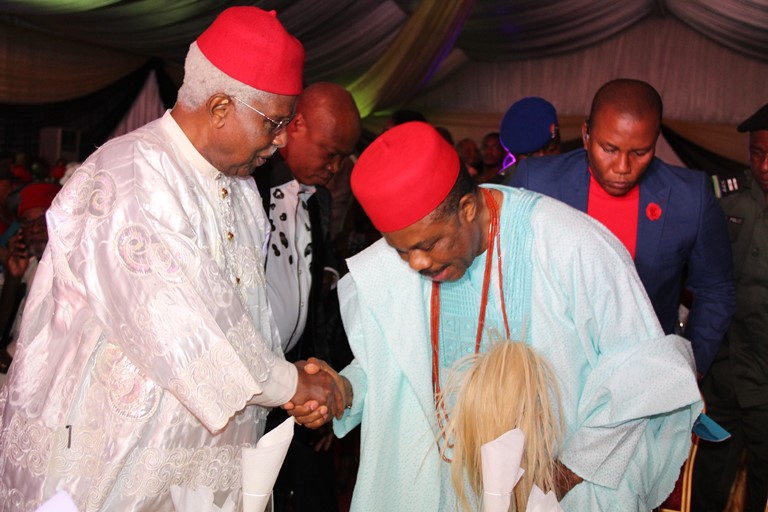The just ended 2016 World Igbo Congress at New York, USA, promises to stand out for the soul – searching mood engendered by Anambra State Governor, Willie Obiano’s address. Obiano who is fast gaining reputation as a philosopher – king with his intellectually – steeped speeches and chain value policies, stirred the audience with an engaging agenda for Igbo renaissance. Coming at a time of Nigeria’s economic recession and political crossroads for the Igbo, the setting could not have been more auspicious for Obiano’s intervention.
Governor Obiano essentially called for the reconstruction of the southeast region in the wake of the various challenges to its development. The framework for this reawakening is both human and infrastructural. In the human realm, the historical and cultural heritage of the Igbo race is to be harnessed and applied in the quest for modern civilisation. ‘Our story…stretches from what we know of the wise and rare kings of ancient Nri in Anambra to the Aro and the Long Juju in today’s Abia State.’ No doubt, the Igbo spirit of enterprise, courage and competition has implications for the present generation in the task of adapting to the demands of a global age. From Olaudah Equiano to the possible Biafran roots of Omar Bongo Jr and from Chinua Achebe to Chimamanda Adichie, the lessons of perseverance, self will and identity cannot be lost.
Yet, a defining mark of the Igbo identity is under grave threat today. Aside the superpower status of English deriving from the West’s nationalization of the language, the fortunes of the Igbo language continues to be eroded by a refusal of some Igbos to come terms with the phenomenon of split personality. In the winner takes all equation that defines much of Nigeria’s power game, fluency in the language of the ruling ethnic group could admit into the banquet hall. If the older generation who grew up in a vernacular climate is semi illiterate in Igbo, the case of the culturally alienated new generation is better imagined than experienced.
Concerted efforts are needed to save the Igbo language from falling into disuse. Top on the priority should be the compilation of a standard Igbo dictionary. The lack of such a definitive reference book has rendered the language dormant.
The ratio of Igbo language air time to English language programmes in government owned broadcast stations presently stand at about 20: 80 percent in favour of English. This lopsidedness cries out for urgent remedy.
States and local governments in the southeast as well as relevant local governments in Rivers and Delta states can give the language a boost by making it the alternative official language at legislative and executive council sessions.
Translation of general and literary classics into Igbo should begin apace. It is regrettable that an Igbo translation of Achebe’s Things Fall Apart was only achieved about the time the guru transited; and even at that, the translation is not in circulation for lack of funds. The Igbo society should also throw into the bargain scholarships for studies in the language and endow prizes for brilliant literary creativity in Igbo.
On the economic sphere, Obiano proposed strategic cooperation among the southeast states and their neighbours as the path to sustainable growth. Advocating combined efforts in crucial areas such as power, roads and security, he stressed the need for a railway line that connects the southeast to the rest of the country to boost trade and commerce. In the light of the region’s peculiar socio – economic condition, the Governor’s paper moved the motion for the introduction of a Marshall Plan; a strong industrialisation package to stimulate the zone’s economy.
There can be no doubt that collaborative ventures, including joint equity holding in companies, if well managed, would have positive economic implications for the federating states. The southeast state governments will do well to gradually move toward joint economic planning and cooperation. The comparable strength of their economies, the similarity of environmental and infrastructure problems and the obvious benefits of partnership as opposed to sole enterprise make the case for future economic integration. Such concerted efforts paved the way for the upgrade of the Akanu Ibiam airport, Enugu, to international status and with renewed resolve as the Anambra State Governor canvassed, greater result can be achieved.
Obiano’s entry on the subject of a political ark to save the Igbo from the deluge of Nigerian politics is a timely home truth. ‘We must come together and draw up a political plan that we shall all agree to invest in and pursue with the resolve of martyrs [emphasis mine.]’ For this writer, what immediately flows from the above submission is the elusive presidential crown. The need to chart a political direction transcending party loyalty is crucial and the Igbo as bearers of the harshest brunt of presidential power cannot afford to be lukewarm about the project. It is however imperative that Ndigbo come to terms with the nature of the Nigerian presidential contest.
The inability of the Igbo to clinch the presidency yet is located in their structural marginalisation in the Nigerian state since the end of the civil war. Reduced to spectator in the military power game, the Igbo aspirant is disadvantaged by the lack of establishment support of the military, the ‘privatised’ public sector, the ‘indigenised’ private sector, the judiciary and to a lesser extent, the media enjoyed by candidates from some other parts of the country. These ethnic controlled institutions with their acquired resource and power base go a long way to determine the content and direction of the presidential process. Given the undue advantages derivable from the exercise of presidential power, these impediments on the way of the southeast would neither be dismantled soon nor willingly. In the prevailing circumstance, a feasible route seems to lie in seizing the opportunity of widespread agitation for restructuring to negotiate statutory rotational presidency among the six geo – political zones.







